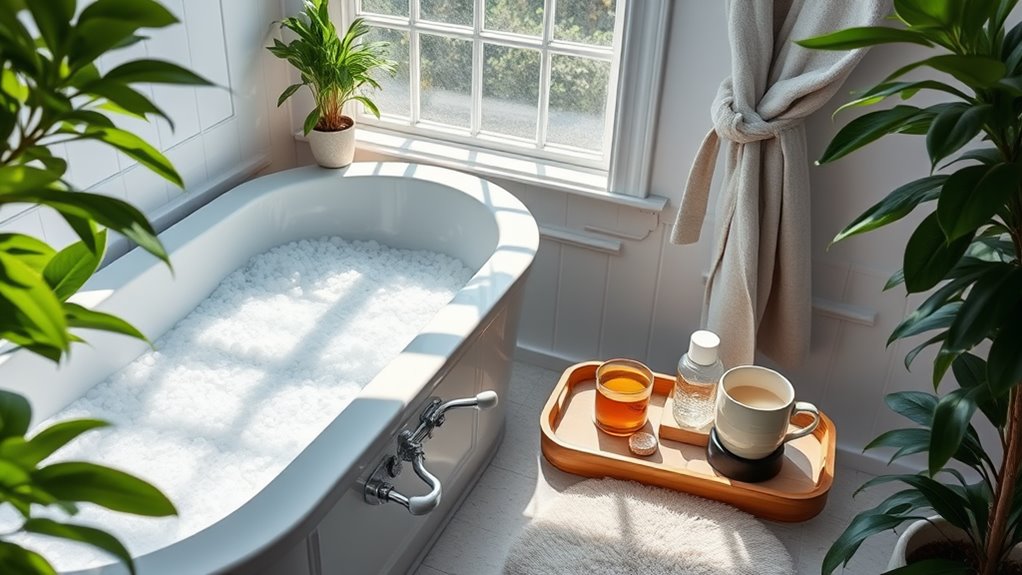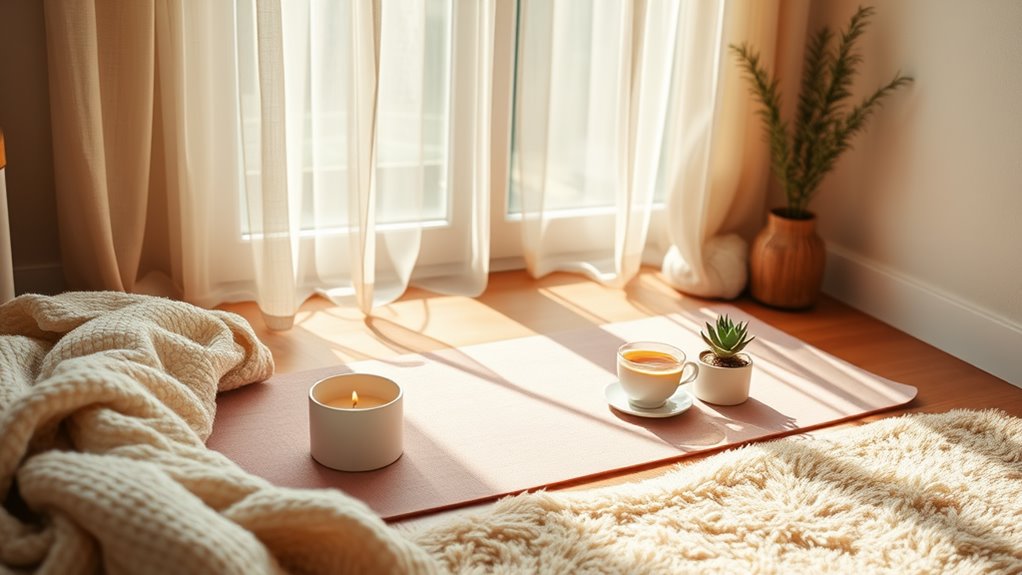The Ultimate Self-Care Routine You Need Every Week
To create the ultimate self-care routine each week, prioritize sleep by aiming for seven to nine hours and maintain a consistent schedule. Nourish your body with healthy foods, engage in regular physical activity, and establish a mindfulness practice to clear your mind. Set personal boundaries to protect your energy and indulge in relaxation techniques. Don’t forget to reflect on your goals and progress while also creating a personalized self-care playlist for motivation. There’s more to discover about enhancing your well-being.
Key Takeaways
- Prioritize at least seven to nine hours of sleep nightly to enhance recovery and overall well-being.
- Incorporate balanced nutrition with leafy greens, lean proteins, whole grains, and healthy fats for sustained energy.
- Engage in 150 minutes of moderate exercise weekly to boost mood, reduce stress, and enhance focus.
- Implement mindfulness practices like deep breathing or meditation to reduce stress and improve emotional regulation.
- Foster social connections and set clear boundaries to protect your energy and maintain supportive relationships.
Prioritize Sleep for Optimal Health
When you prioritize sleep, you set the foundation for better overall health and well-being. Make it a non-negotiable part of your weekly self-care routine. Aim for seven to nine hours each night, as this amount optimizes cognitive function and emotional balance.
Create a serene bedtime ritual—dim the lights, disconnect from screens, and unwind with a calming activity. This structured approach signals your body that it’s time to recharge.
Don’t underestimate the power of a consistent sleep schedule; going to bed and waking up at the same time helps regulate your internal clock. Adequate sleep also enhances your body’s ability to recover and repair after daily stresses, making it crucial for maintaining optimal health.
Nourish Your Body With Healthy Foods
To truly nurture your body, it’s essential to choose nutritious foods that fuel your energy and support your health.
Adopting a balanced diet isn’t just about restriction; it’s about indulging in the right options. Here are four critical foods you should incorporate into your meals:
-
Leafy Greens – Packed with vitamins and minerals, greens like spinach and kale boost your immune system.
-
Lean Proteins – Sources like chicken, fish, and legumes help repair and build your muscles.
-
Whole Grains – Brown rice, quinoa, and oats provide sustained energy and fiber for digestion.
-
Healthy Fats – Avocados, nuts, and olive oil support brain health and hormone balance.
Engage in Regular Physical Activity
Engaging in regular physical activity is essential for your overall well-being and enhances both your mental and physical health. Whether you prefer jogging, yoga, or weightlifting, find an activity that excites you.
Consistency is key; aim for at least 150 minutes of moderate exercise each week. Not only does this boost your energy levels, it also improves your mood and focus.
Consider incorporating strength training to build muscle and support metabolic health. Set specific goals, track your progress, and challenge yourself incrementally. Additionally, participating in physical activities can serve as a way to clear your mind, helping to reduce stress and enhance clarity in your daily life.
Establish a Mindfulness Practice
Mindfulness can greatly enhance your well-being by reducing stress and improving focus. You can easily incorporate simple techniques, like deep breathing or guided meditation, into your daily routine. Let’s explore how these practices can benefit you and how to get started. One powerful method to consider is focused breathing, which can transform your day in just five minutes.
Benefits of Mindfulness
How can embracing mindfulness transform your daily life? When you cultivate a mindfulness practice, you tap into a wealth of benefits that enhance your overall well-being.
Here are four remarkable advantages you’ll experience:
-
Reduced Stress: Mindfulness helps you manage anxiety, allowing you to approach challenges with calmness.
-
Improved Focus: By honing your attention, you’ll find it easier to stay present and engaged in tasks.
-
Enhanced Emotion Regulation: Mindfulness empowers you to recognize and process your feelings, fostering emotional resilience.
-
Greater Self-Awareness: It encourages introspection, helping you understand your thoughts and behaviors more deeply.
Simple Mindfulness Techniques
While it might seem challenging at first, establishing a mindfulness practice can be straightforward and deeply rewarding. Start by incorporating simple techniques into your daily routine. Here are some effective methods to contemplate:
| Technique | Duration | Benefits |
|---|---|---|
| Breathing | 5 minutes | Reduces stress, centers mind |
| Body Scan | 10 minutes | Enhances body awareness, relaxation |
| Guided Meditation | 15 minutes | Focuses attention, calms anxiety |
| Mindful Walking | 20 minutes | Combines movement and mindfulness, boosts mood |
Experiment with these techniques to find what resonates with you. Consistency is key; commit to a daily practice, and you’ll soon notice profound changes in your mindset, awareness, and overall well-being.
Schedule Time for Hobbies and Creativity
Why is it so important to carve out time for hobbies and creativity in your self-care routine? Engaging in creative activities not only enhances your well-being but also fuels personal growth.
Here’s how to make it a priority:
-
Identify your passions: Explore what truly excites you, whether it’s painting, writing, or gardening.
-
Set a schedule: Block out specific times each week dedicated solely to your hobbies.
-
Create a conducive environment: Designate a space that inspires you and minimizes distractions.
-
Embrace the process: Focus on enjoyment rather than perfection; allow creativity to flow freely. Daily journaling paired with positive affirmations can help increase self-awareness and further enhance your creative pursuits by providing clarity.
Connect With Friends and Loved Ones
Engaging in hobbies fuels creativity, but connecting with friends and loved ones enriches your self-care routine even further. These bonds provide support, encouragement, and joy, essential for a fulfilling life.
Schedule regular catch-ups, whether a casual coffee or a game night. Prioritize these connections; they foster a sense of belonging and purpose.
Don’t underestimate the power of a heartfelt conversation or shared laughter. They can uplift your mood and provide fresh perspectives. Embrace vulnerability—share your challenges and triumphs. This openness deepens relationships and invites reciprocity.
Consider reaching out to someone you haven’t spoken to in a while; rekindling these connections can be profoundly rewarding. Additionally, making time for a rejuvenating routine every week can enhance your mental and emotional well-being.
Ultimately, nurturing your relationships nurtures your overall well-being, making you more resilient to life’s challenges.
Set Boundaries to Protect Your Energy
Setting boundaries is essential for protecting your energy and well-being.
You need to define your limits and communicate them clearly to others so they understand your needs.
Prioritizing your own health will empower you to maintain meaningful connections without draining yourself.
Define Your Limits
Although you may feel pressured to meet everyone’s expectations, defining your limits is essential to protecting your energy.
By setting clear boundaries, you create a space where you can thrive. Start with these four steps:
-
Identify Your Priorities: Know what truly matters to you and let that guide your decisions.
-
Learn to Say No: Practice declining commitments that drain you or don’t align with your goals.
-
Schedule Downtime: Carve out regular time for self-care, ensuring you recharge and reflect.
-
Evaluate Relationships: Surround yourself with positivity and distance yourself from those who overwhelm you.
Communicate Clearly and Effectively
How can you guarantee your boundaries are respected while maintaining healthy relationships? First, clarity is key. Express your limits directly and confidently, using “I” statements to communicate your needs. For instance, say, “I need time to recharge this weekend” instead of ambiguous hints.
Active listening is equally important; when others share their needs, engage fully. Foster a dialogue that respects both parties’ boundaries. Be consistent in enforcing your limits; people are more likely to respect them when they see you uphold them.
Ultimately, don’t shy away from re-evaluating your boundaries as situations change. Healthy relationships thrive on open communication, so practice articulating your boundaries regularly. This commitment will safeguard your energy and strengthen your interpersonal connections.
Prioritize Your Well-Being
To prioritize your well-being, it’s essential to identify and maintain boundaries that protect your energy.
Establishing these limits isn’t just important; it’s empowering. Start by considering these strategies:
-
Say No: Learn to decline requests that drain you or don’t align with your goals.
-
Limit Screen Time: Set specific times for tech use to safeguard your mental space.
-
Schedule ‘Me Time’: Block off periods in your calendar solely for self-care activities.
-
Communicate Needs: Clearly express your boundaries to friends and family to cultivate respect and understanding.
Indulge in Relaxation Techniques
As you immerse yourself in relaxation techniques, you’ll discover the transformative power of taking time for yourself amidst life’s chaos. Start by setting aside a few moments each day for focused breathing exercises. This practice sharpens your awareness and calms your mind.
Next, explore the world of meditation; even five minutes can create a profound shift in your mental space. Don’t overlook the benefits of gentle yoga or stretching—these movements help alleviate physical tension, enhancing your overall well-being.
Finally, consider journaling as a means of processing thoughts and emotions. By prioritizing these techniques, you’ll cultivate a sanctuary within yourself, fostering resilience and clarity that empowers you in all aspects of life. Embrace this essential aspect of your self-care routine.
Reflect on Your Goals and Progress
To enhance your self-care routine, it’s important to set clear objectives for what you want to achieve.
Regularly evaluating your achievements can provide valuable insights into your progress and motivate you to stay on track.
Set Clear Objectives
Setting clear objectives is essential for your self-care journey, as it helps you focus on what truly matters. When you define your goals, you create a roadmap for success.
Here are four key steps to set effective objectives:
-
Identify Priorities: Determine which areas of your life need the most attention.
-
Be Specific: Formulate clear, measurable goals to track your progress.
-
Set Timeframes: Establish deadlines to keep yourself accountable and motivated.
-
Stay Flexible: Be ready to adjust your goals as your circumstances or needs evolve.
Assess Achievements Regularly
Regularly evaluating your achievements is essential for staying on track with your self-care goals. This practice helps you reflect on your progress and adjust your strategies accordingly. Set aside time each week to assess what you’ve accomplished and identify areas needing improvement.
| Area of Focus | Reflection/Notes |
|---|---|
| Mental Well-being | Tactics that worked? |
| Physical Health | Consistency in routines? |
| Emotional Resilience | Triggers recognized? |
| Personal Development | Skills enhanced? |
| Social Connections | Quality vs. quantity? |
Create a Personalized Self-Care Playlist
How can a personalized self-care playlist elevate your mood and enhance your well-being? Curating a playlist tailored specifically for your self-care needs can transform your emotional landscape. Here’s how to create one that resonates with you:
-
Identify Your Mood: Reflect on how you want to feel—calm, energized, or inspired—so you can select fitting tracks.
-
Select Variety: Include a mix of genres and tempos to keep your playlist dynamic and engaging.
-
Add Personal Favorites: Incorporate songs that evoke nostalgic memories or meaningful experiences, enhancing your connection to the music.
-
Update Regularly: Refresh your playlist monthly to guarantee it aligns with your evolving self-care journey.
Invest time in your playlist; it’s a powerful tool for self-transformation and mindfulness.
Frequently Asked Questions
How Do I Start a Self-Care Routine on a Budget?
To start a self-care routine on a budget, prioritize low-cost activities like journaling, walking, or meditating. Get creative with what you have; even simple rituals can rejuvenate your mind and body effectively.
Can Self-Care Be Effective for Mental Health Conditions?
Absolutely, self-care can be effective for mental health conditions. When you prioritize your well-being, you build resilience, manage stress better, and foster a positive mindset. It’s a powerful tool for enhancing your overall mental health.
What Should I Do if I Feel Guilty About Self-Care?
Feeling guilty about self-care’s common. Remember, prioritizing yourself isn’t selfish; it’s essential. Acknowledge your feelings, then embrace self-care as a necessary component for your overall well-being. You deserve time to recharge and thrive.
How Do I Stay Motivated to Maintain My Self-Care Routine?
To stay motivated in your self-care routine, set clear goals, track your progress, and celebrate small wins. Remember, prioritizing yourself isn’t selfish; it’s essential for growth and resilience in all areas of your life.
Are There Specific Self-Care Activities for Different Personality Types?
Tailor self-care activities to your personality. For introspective types, journaling or meditation energizes; social butterflies thrive in group activities and gatherings; adventurous souls might explore nature. Find what resonates most, and make it yours.





